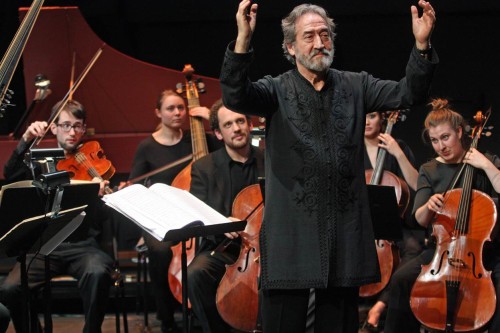 United States Robert Johnson, Matthew Locke, Henry Purcell: Stage Music in the Plays of William Shakespeare, Juilliard415, Juilliard Actors from Group 45, Jordi Savall (director), Manfredo Kraemar (concert master), Baryshnikov Arts Center, New York, 24.2.2014, (SSM)
United States Robert Johnson, Matthew Locke, Henry Purcell: Stage Music in the Plays of William Shakespeare, Juilliard415, Juilliard Actors from Group 45, Jordi Savall (director), Manfredo Kraemar (concert master), Baryshnikov Arts Center, New York, 24.2.2014, (SSM)

Photo (C) Hiroyuki Ito
Robert Johnson: Music for The Winter’s Tale Music for Macbeth
Matthew Locke: Music for The Tempest
Henry Purcell: Music from The Fairy Queen (based on Shakespeare’s A Midsummer Night’s Dream)
Encore:
Rameau: Final Contredanse from Les Boréades
What a magical concert this was, so replete with sumptuous music that the only thing I missed were the words that accompany the gorgeous melody of “Love’s sweet passion” from The Fairie Queen:
If Love’s a Sweet Passion, why does it torment?
If a Bitter, oh tell me whence comes my content?
Since I suffer with pleasure, why should I complain,
Or grieve at my Fate, when I know ’tis in vain?
Yet so pleasing the Pain, so soft is the Dart,
That at once it both wounds me, and tickles my Heart.
The magician here was Jordi Savall, both Oberon and Prospero to the musicians and actors. From the opening orchestral salvo to the hand-clapping encore, everything meshed in a perfect harmony seldom experienced at other such events.
The program featured masques and incidental music from Shakespeare’s two most phantasmic plays, The Tempest and A Midsummer Night’s Dream. Before each musical segment, a short introduction was given and an excerpt was performed, which helped one put the music that followed into a more meaningful context. Starting with selections from Robert Johnson’s music written to accompany Shakespeare’s own productions, the program mesmerized.
Jordi Savall joined in as an instrumentalist only in the opening Johnson pieces, preferring instead to conduct from the podium. Bowing, without a smile, he struck a pose of severity that belied the bucolic, unaffected music he was leading. It wasn’t until the encore that one saw the warmth and humanity which, in addition to his musical command, have earned him innumerable awards and carried him to the top of the early music profession.
I’ve always considered Henry Purcell the Shakespeare of music, only stopped by a premature death from achieving Shakespeare’s renown. Early critics and students of Shakespeare argued a nature versus nurture source of his genius: did the playwright’s preternatural talents spring full-blown from his head? Or was it the result of immense book reading or a photographic memory? The same question can be asked of Purcell, whose music is rife with melodies that appear and disappear so quickly that one wonders whence the source of this musical stream.
This question of Purcell’s genius has been partially answered for me by hearing Matthew Locke’s Music for The Tempest. The opening Introduction is so close harmonically to the Overture to Dido and Aeneas one might think it was the ground for the latter. The middle movement of The Tempest, a sarabande, is a haunting lyrical interlude whose shifting harmonies place it far beyond its time and had to have influenced Purcell. The “Curtain Tune” that comes towards the end of the suite must be one of the earliest uses of dynamics to depict a storm: crescendos that are marked “lowder by degrees” and decrescendos as “soft, softer, softest.” This piece goes musically beyond even Purcell’s winter storm scene from his King Arthur into the instrumental world of Rameau.
I would have to give the name of everyone on stage to fairly and adequately praise this production. Savall was lucky to have the eminent violin virtuoso Manfredo Kraemer as concert master. His clean intonation and well-judged articulation were a model for the rest of the players. Trumpeters Timothy Will and Caleb Hudson have to be singled out for their peerless playing, as close to perfection as anything I’ve heard on the Baroque trumpet, particularly in the “Echo” movement of A Midsummer Night’s Dream. The recorder players, Lindsay McIntosh and Allen Hamrick gave a plangent reading of the delightful “Birds’ Prelude.”
For an encore, Savall led the group in the final contredanse from Rameau’s Les Boréades. For this he asked the audience to clap their hands when the opening theme was played. This would be the first time since elementary school that I was asked to clap out a rhythm. It’s good to know that I can still do it.
Stan Metzger